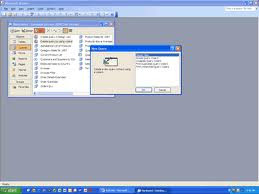Introduction
The real power of an Access 2007 database is in the ability to pull data for quick analysis, which is what happens when you run a query. Queries allow you to retrieve information from one or more tables based on a set of search conditions you define. Access 2007 will display your results in their very own table that you can analyze and manipulate further. This lesson will explain how to plan a query using a three-question planning process. You will learn how to use the Query Design command to run the query, as well as how to modify the query to hide fields or other information in your query results. Finally, it will show you how to save the query for later use.
Using
Queries
Queries retrieve information from one or more tables based on a set
of search conditions that you set up and then combine that information in a way
that is easy for you to analyze. If you have used an Advanced Filter in Access 2007,
then you have already run a very basic query on only one table. If you want to
pull data from more than one table, though, you will need to use either the
Query Design command or the Query Wizard.
Before using the Access 2007 query
tools, it is important to plan out the query using a logical process.
Otherwise, you may not get the results you expect.
Planning a Query
There are three questions you need to answer when you are planning a query:- What do you want the results to look like? Identify every field or bit of information that you want included in the results.
- Where is the information stored in the database? List which tables (and/or queries) hold the information that you want to see.
- What conditions do you want the data to meet? This helps determine how to set the criteria so Access can search the records properly.
Planning: Which Customers Ordered Technology Books?
Let's think about this process for our bookstore database scenario. We have new technology series coming out soon, and we want to send coupons to customers that have ordered technology books from us in the past. A query can help us answer the question: which customers have ordered technology books from us already? Let's use the three-question process to plan this query.- What fields do we want to see in the results? We need a list of customer names and addresses in order to mail the coupons to our customers, so we'll need the results to show:
- In which tables is the information stored? Well, for this query we'll need:
- Customers table - to get the customers' names and addresses
- Books table - to know which books are technology books
- Orders table - to know which customers ordered those books.
- What is the condition we want the data to meet? We want Access to look for only the books where the book's category is technology.
Using the Query Design Command
Once you have planned out your query, you can build and run it using Access 2007's query tools.To Build a Query using the Query Design Command
To build and run a query using the Query Design command:- Select the Query Design command from the Create tab on the Ribbon.
- Use the Show Table dialog box to select which tables (and/or queries) to include in the query. Our plan called for all three tables.
- Drag and drop the fields you want to see in your results to the bottom portion of the query design screen.
- Enter the condition in the Criteria row for the condition field. For our query, we typed Technology in the cell labeled Criteria for the Category field. As seen above, Access 2007 puts quotation marks around the term to show it is looking for exactly that term within the designated field.
- Once the condition is set, click Run! in the Results group on the Ribbon.
- Finally, view your results to determine if they match your desired results.
Hiding Fields or Other Information in the Results
Sometimes the results of a query will include information that is seemingly unnecessary to you. Access 2007 allows you to easily hide these fields.To Hide Part of the Query Result
To hide a field in your query results:- In the query design window, de-select the Show option by clicking on it.
- Now, when you run your results, that field will be hidden, as seen below.
Query Results with Category Field
Hidden
Saving the Query
Sometimes you will not need to save your results or your query design. Other times, you may want to keep it to run again later or to modify it slightly. Saving a query is very easy to do.To Save a Query
To save the query for later use:- Right click on the query tab.
- When the Save As dialog box opens, give your query a meaningful name.
- Click OK.
- The query will now be listed in the object list on the left side of the Access window.
Challenge!
- Plan a query to find out which customers order a certain category of books.
- Use the Query Design command to set up the query.
- Run the query and view your results.
- Save the query.
- Modify the query to hide a field.

No Response to "Using Queries to Make Data Meaningful-Part 1"
Post a Comment